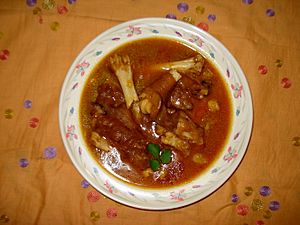Paya (food) facts for kids
|
Paya curry
|
|
| Alternative names | Siri Paya |
|---|---|
| Type | Soup or curry |
| Course | Dinner |
| Place of origin | India, Pakistan, Afghanistan |
| Region or state | Indian subcontinent |
| Main ingredients | Trotters or hoof (goat, beef, buffalo, or sheep), onions, tomatoes, garlic, curry powder and other spices |
Paya is a traditional food from the Indian Subcontinent.
It is also served at various festivals and gatherings, or made for special guests. Paaya means Legs in Hindi-Urdu.
The main ingredients of the dish are the trotters (or hoof of a beef, goat, buffalo or sheep; cooked with various spices.
Contents
Origins
The paya originated from the amalgamation of South and Central Asian cuisine. In Central Asia it was known as pacha. The dish was adapted to the local cuisines by the Muslim cooks of Lahore, Hyderabad of Telangana State and Lucknow..
Subsequently, paya became popular all over present-day India, Pakistan and Bangladesh. Outside the Indian subcontinent, is also available in restaurants that serve South Asian cuisine. In Delhi it is sometimes also referred to as "khurode" from the "khur" or hoof.
Recipes
Recipes for this dish vary regionally. The soup base is created by sautéed onions and garlic, where a number of curry-based spices are then added to the meat and bones. The cooked dish is served with a garnish of fresh diced ginger and fresh long coriander leaves, along with fresh sliced lemon.
Cooking methods
It is slow cooked on low heat for hours (usually overnight) on the stove. However, nowadays it is mostly cooked in a pressure cooker.
Historically, when people used wood or coal as a cooking fuel, Preparation would start this dish at night and slow cook it in the coals until the morning. This dish has a soup-like consistency and is usually eaten as a breakfast food in the winter months with naan.
Variations
There are many variations where siri means the head of an animal and paya means the feet. It is considered a delicacy.
See also
 In Spanish: Siri paya para niños
In Spanish: Siri paya para niños



